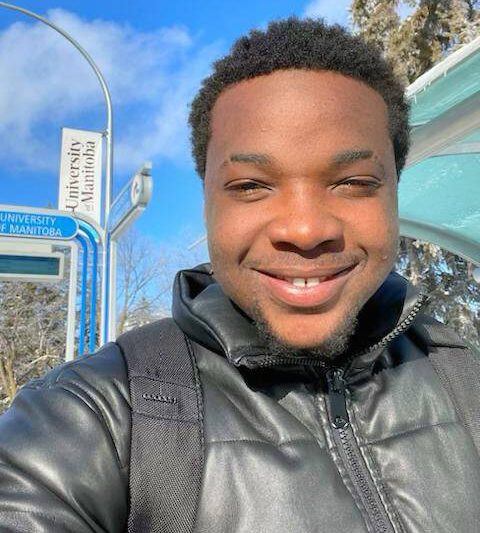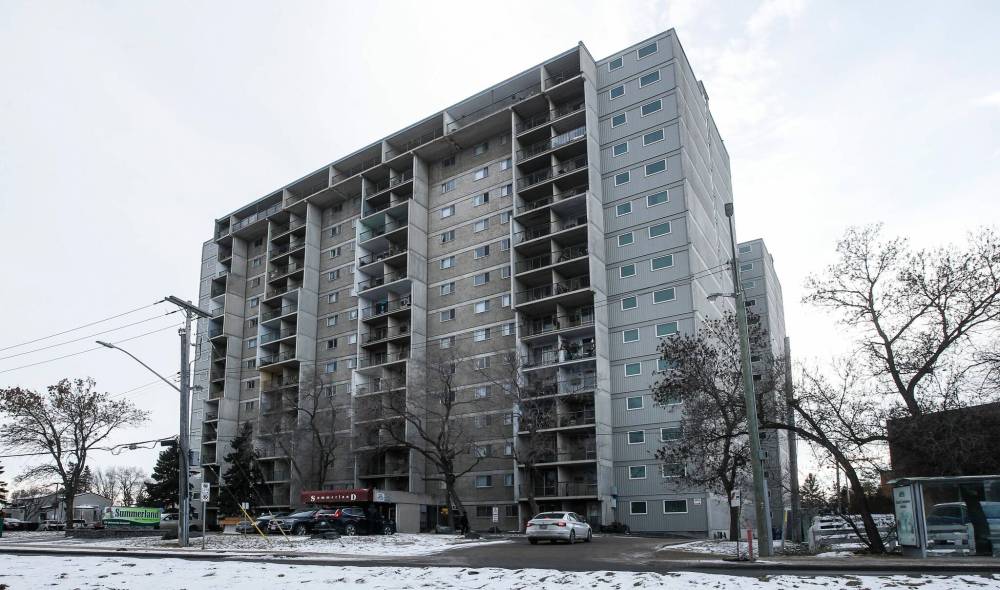International student shot, killed by police was in crisis, needed help: family’s lawyer ‘Drop the knife’ heard on audio clip; witnesses insist 911 operator was told 19-year-old in distress, not dangerous
Read this article for free:
or
Already have an account? Log in here »
To continue reading, please subscribe:
Monthly Digital Subscription
$0 for the first 4 weeks*
- Enjoy unlimited reading on winnipegfreepress.com
- Read the E-Edition, our digital replica newspaper
- Access News Break, our award-winning app
- Play interactive puzzles
*No charge for 4 weeks then price increases to the regular rate of $19.00 plus GST every four weeks. Offer available to new and qualified returning subscribers only. Cancel any time.
Monthly Digital Subscription
$4.75/week*
- Enjoy unlimited reading on winnipegfreepress.com
- Read the E-Edition, our digital replica newspaper
- Access News Break, our award-winning app
- Play interactive puzzles
*Billed as $19 plus GST every four weeks. Cancel any time.
To continue reading, please subscribe:
Add Free Press access to your Brandon Sun subscription for only an additional
$1 for the first 4 weeks*
*Your next subscription payment will increase by $1.00 and you will be charged $16.99 plus GST for four weeks. After four weeks, your payment will increase to $23.99 plus GST every four weeks.
Read unlimited articles for free today:
or
Already have an account? Log in here »
Hey there, time traveller!
This article was published 02/01/2024 (695 days ago), so information in it may no longer be current.
A 19-year-old international student was in the throes of a mental-health crisis Sunday when he was shot and killed by Winnipeg police officers, says a lawyer representing the man’s devastated family in Nigeria.
Jean-René Dominique Kwilu — who sits on a provincially appointed committee tasked with improving police training — said he has interviewed eyewitnesses from Sunday’s incident who have concerns about the officers’ actions leading up to the shooting.
He identified the man who was killed as Afolabi Stephen Opaso, a University of Manitoba student who lived in an apartment at 77 University Cres.
“Based on different eyewitnesses I was able to gather, basically (Opaso) was having a mental-health incident. Somebody called for help and indicated to the dispatcher that a person was in need of help and it was a mental-health issue,” Kwilu said.
Police responded to a call from someone inside the building at about 2:30 p.m. Sunday. The caller told police a man was armed and acting erratically, Winnipeg Police Service Chief Danny Smyth told reporters during a news conference Monday.

Two officers went to the apartment building and found a man wielding two knives inside the suite, Smyth said.
Police have not said whether he attempted to attack officers.
“Our officers, moments later, were involved in a use-of-force encounter that resulted in the male being shot by one of our officers,” he said.
The 19-year-old man was taken to hospital and later died of his injuries. He was known to police through an encounter last July when officers gave him a ride, but had no criminal record, Smyth said.
A 21-year-old man and 19-year-old woman were also present at the time of the shooting. They were not injured and are now considered witnesses. All three knew each other, Smyth said.
Opaso was studying economics and has no relatives in Canada. His parents are in Nigeria and his older sister lives in Texas, Kwilu said.
“The family is overwhelmed, so talking to them right now is challenging because every time they are crying and upset. We are just trying to get more answers, more information,” he said.
An audio clip, obtained by Kwilu and reviewed by the Free Press, appears to document the moment immediately leading up to the shooting.
In the 26-second recording, police are heard saying, “drop the knife,” three times, before firing three shots. Nine seconds pass between the time the first command is issued and the first shot is fired.
No other words are distinguishable and the clip provides limited context as to what occurred.
Witnesses told Kwilu that Opaso opened the door for responding officers. Additional evidence provided to him, including photographs of blood left behind after the incident, indicate Opaso was shot near the suite’s entrance, Kwilu said.
A WPS spokesperson said police are not aware of the audio clip and cannot provide further details on the shooting, which is now under the authority of the Independent Investigation Unit of Manitoba.
The provincial police watchdog, which oversees all fatal incidents involving police, also refuses to comment on ongoing investigations.
It is critical investigators determine whether the responding officers were aware of Opaso’s mental-health status, Kwilu said, adding witnesses insist a 911 emergency dispatcher was told Opaso was not dangerous, but it’s unclear whether that information made it to police.
“It’s a question of whether this dispatch was done properly,” he said, adding a clinician trained in mental-health crisis intervention may have helped de-escalate the situation.
“(Opaso’s family) want to know how a call for someone who is having a mental-health episode, a call for help, would lead to (Opaso) being shot. That’s where we need to get more answers.”
“(Opaso’s family) want to know how a call for someone who is having a mental-health episode, a call for help, would lead to (Opaso) being shot.”–Lawyer Jean-René Dominique Kwilu
Since 2021, a program in Winnipeg has paired plain-clothes police officers and clinicians to help people experiencing a mental health crisis in non-criminal and non-emergent situations. Two uniformed officers respond first and decide whether it is safe and necessary to call in the police-civilian pairing.
The initiative, called alternative response to citizens in crisis, began as a pilot project between the WPS and Health Sciences Centre’s crisis response centre. Its goal is to free up hospital emergency-room resources and improve responses to mental-health calls.
The program was made permanent with $414,000 in funding from the former Progressive Conservative provincial government last June. However, the planned expansion had stalled, as of September, due to a shortage of clinicians.
A Shared Health spokesman said ARCC hired two more staff members in October to expand coverage from five days to seven days a week, from 9 a.m. to 9 p.m.
During its pilot period, ARCC responded to 882 incidents involving 530 people, according to provincial government data.
Of those, 82 per cent were resolved by ARCC intervention alone, while the number of patients taken to emergency rooms by police for a mental-health assessment was reduced by almost 30 per cent.
In its November throne speech, the NDP government said it will hire more mental-health workers to respond to non-violent calls for help. Details have not yet been announced.
WPS responded to more than 20,000 well-being calls in 2022.
“Our government’s priority is to make sure that every Manitoban is safe and treated fairly by the justice system.”–Justice Minister Matt Wiebe
As an alternative to the ARCC program, Winnipeg’s Police Accountability Coalition is advocating for a civilian-led crisis service similar to one that Toronto’s council is seeking to make permanent in 2024.
In that city, teams of specialized workers respond to non-emergency crisis calls and wellness checks without police.
“It’s the idea that civilians show up first, and if the civilians feel they need police support, the police are called,” said Kate Kehler, a coalition member and executive director of the Social Planning Council of Winnipeg. “They (clinicians) are folks who are often known already to the people in crisis.”
Manitoba Justice Minister Matt Wiebe said Tuesday the government plans to hire 100 mental-health professionals to work alongside law enforcement on non-violent calls. He said the province is currently planning how to roll out the positions.
Wiebe also announced the government is willing to provide financial help to municipal police services for the purchase of body-worn video cameras for officers.
“Our government’s priority is to make sure that every Manitoban is safe and treated fairly by the justice system,” he said in a statement. “Body-worn cameras can be part of that equation, to increase transparency to protect everyone involved in police interactions.
“As they are implemented by police services across Manitoba, we are ready to help ensure that costs and processes associated evidence disclosure and privacy are supported.”
The apartment tower at 77 University Cres. where Afolabi Stephen Opaso was shot by police on Sunday. (John Woods / Wnnipeg Free Press)
Kwilu remains in daily contact with Opaso’s family.
“There needs to be an autopsy, of course,” he said. “Once that is conducted and the coroner’s office is ready to release the body, then we can start with all the funeral arrangements.”
Sunday’s deadly incident marks the second fatal police shooting in the past week.
On Friday, police announced the death of a 52-year-old man they say was holding a 19-year-old woman hostage when he was shot multiple times Thursday afternoon inside a Manitoba Housing complex at 25 Furby St.
Smyth said the Sunday incident did not appear to be a hostage situation.
“Very different events, very different circumstances for both of them. Clearly, they’re not related but we go to thousands of calls every week and we just deal with what we have,” he said Monday.
Police had no updates on the Furby shooting investigation as of Monday afternoon. The IIU is also in charge of investigating the incident.
– with files from Chris Kitching
tyler.searle@freepress.mb.ca

Tyler Searle is a multimedia producer who writes for the Free Press’s city desk. A graduate of Red River College Polytechnic’s creative communications program, he wrote for the Stonewall Teulon Tribune, Selkirk Record and Express Weekly News before joining the paper in 2022. Read more about Tyler.
Every piece of reporting Tyler produces is reviewed by an editing team before it is posted online or published in print — part of the Free Press‘s tradition, since 1872, of producing reliable independent journalism. Read more about Free Press’s history and mandate, and learn how our newsroom operates.
Our newsroom depends on a growing audience of readers to power our journalism. If you are not a paid reader, please consider becoming a subscriber.
Our newsroom depends on its audience of readers to power our journalism. Thank you for your support.
History
Updated on Tuesday, January 2, 2024 12:04 PM CST: Adds information about alternative response to citizens in crisis pilot program.
Updated on Tuesday, January 2, 2024 5:45 PM CST: Adds background, quotes, headline changed.












